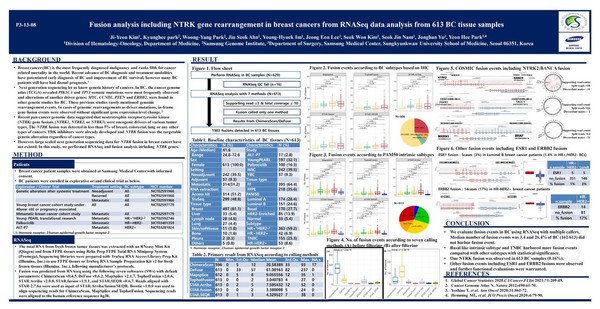SAN ANTONIO, Texas – By Kim Yun-mi/Korea Biomedical Review correspondent - How many Korean breast cancer patients can use tumor-agnostic therapies? A local study that can suggest a clue to this question has been disclosed at the San Antonio Breast Cancer Symposium (SABCS 2021).
Professor Kim Ji-yeon of the Hematology-Oncology Department of Samsung Medical Center made a poster presentation on Thursday, releasing the analysis of the fusion status, including the neurotrophic tyrosine receptor kinase (NTRK) gene fusions, by RNA sequencing (RNASeq) of tissue samples from 613 breast cancer patients.

The research team said breast cancer is the most frequently diagnosed malignancy and ranks fifth for cancer-related mortality globally.
The recent advancement of early diagnosis and treatment made it possible to detect breast cancer earlier and improve survival rates. However, the research team said many breast cancer patients still have a disappointing prognosis.
Next-generation sequencing (NGS) allowed researchers to know the genetic history of cancers, the research team went on to say.
The cancer genome atlas (TCGA) found that PIK3CA and TP53 somatic mutations were most frequently observed in breast cancer, and other studies discovered alterations of other driver genes such as MYC, CCND1, PTEN, and ERBB2, it said.
Recently, researchers have suggested NTRK gene fusions (NTRK1, NTRK2, or NTRK3) could be oncogenic drivers of various cancers, the research team noted.
“The NTRK fusion was detected in less than 5 percent of breast, colorectal, lung, or any other types of cancers. TRK inhibitors were already developed, and NTRK fusion was the targetable genetic alteration regardless of cancer types.”
The research team collected samples of breast cancer patients who participated in trials at Samsung Medical Center and performed RNA sequencing.
The research team found 1,983 fusions by analyzing RNASeq data of 613 patients in seven methods.
The immunohistochemistry (IHC) profiling showed that 356 patients (58.7 percent) had HR+/HER2- breast cancer, 42 (6.9 percent), HR+/HER2+ breast cancer, 53 (8.7 percent), HR-/HER2+ breast cancer, and 115 (25.6 percent), triple-negative breast cancer (TNBC).
By intrinsic subtype, 174 (29.9 percent) were luminal A, 151 (24.6 percent), luminal B, 170 (27.7 percent), basal-like, 85 (13.9 percent), HER2-enriched (HER2E), and 33 (5.4 percent), normal type.
Fusion events based on IHC appeared in 59 percent in HR+/HER2- breast cancer, 26 percent in TNBC, 9 percent in HR-/HER2+ breast cancer, and 7 percent in HR+/HER2+ breast cancer.
Fusion events according to intrinsic subtypes occurred in 28 percent in luminal A and basal-like, respectively, and 25 percent in luminal B, 14 percent in HER2E, and 5 percent in normal type.
The research team said there was only one NTRK fusion (0.16 percent) in 613 breast cancer samples, which was extremely rare.
“Other fusion events including ESR1 and ERBB2 fusions were observed, and further functional evaluations were warranted,” it said.
TRK inhibitors are already available for patients with NTRK fusion regardless of cancer type in Korea.
Bayer’s Vitrakvi (larotrectinib) and Roche’s Rozlytrek (entrectinib) have arrived in the local market. Still, they are not covered by health insurance and are only used under the drugmaker’s expanded access program (EAP).
Last month, the Health Insurance Review and Assessment Service (HIRA) held the 10th meeting of the drug reimbursement evaluation committee and recognized that Vitrakvi was valid for reimbursement.
However, reimbursement for Rozlytrek will be granted if Roche accepts the committee’s proposal to reduce the drug price and agrees on the offered reimbursement rate, HIRA said.
If drug price negotiations and the government’s review progress smoothly, Vitrakvi could become reimbursable in early next year at the earliest.

